How to Write a First-Class Law Essay: Mastering the FIRAC Model
Law essays can be challenging, but they contribute significantly to the mastery of legal principles and enhancing a student’s legal research skills. A first-class law essay does not only demonstrate a thorough understanding of legal principles, but is also clearly structured and incredibly well-written. In this article, we will guide you on how to write a first-class law essay, delve into the FIRAC model of legal writing, and address frequently asked questions on law essay writing.
Below is an outline of the points that will be discussed in detail throughout the article:

Understanding the Essay Question and Planning
Comprehensive legal research, writing techniques for a first-class law essay, common faqs on law essay writing.
Table of Contents
The first step in writing a top-notch law essay is to understand the essay question and planning your response. You should take care to read and analyze the question provided, identifying the main issues, required legal areas, and the keywords that will guide your research. Create a rough essay plan, outlining the main arguments and research resources necessary to address the topic.
Thorough researched is necessary in order to write a first-class law essay.This involves examining relevant cases, statutes, academic articles, and other authoritative sources. It is crucial to:
- Build a strong foundation of understanding for the specific legal topics involved
- Identify any contrary viewpoints and conflicting interpretations of the law
- Familiarize yourself with critical legal developments that may affect your essay’s arguments
It is essential to keep track of your sources and their essential details, as you will need to reference them accurately in your essay.
Structuring a Law Essay: The FIRAC Model
The FIRAC model is a universally recognized method of organizing and presenting legal arguments in writing. It consists of:
Start by providing a concise and relevant summary of the facts and background of the issue beingaddressed. Be objective and neutral in your presentation, ensuring that your readers have a clear understanding of the context.
Clearly identify the specific legal issues that arise from the facts. This may involve direct questions or problems that need to be resolved by referring to legal authorities, such as legislation, case law, or academic commentary.
Set out the relevant legal rules, principles, and precedents that apply to the issues in question. Present a clear and comprehensive explanation of the legal authorities and how they apply to the facts.
d. Analysis:
In this section, critically analyze and weigh the various arguments and approaches concerning the legal issues at hand. Provide a detailed evaluation of the relevant legal authorities,discussing their strengths and weaknesses, and highlighting any ambiguities, disagreements, or gaps in the law that are relevant to the issues being addressed.
e. Conclusion:
Wrap up your essay by summarizing the main points, integrating your key findings and the implications of your analysis. Be sure to address the initial essay question and provide a clear answer or position based on your research and discussion. Finally, offer any recommendations or propose potential legal reforms if appropriate.
To ensure that your law essay stands out as first-class, it is essential to embrace effective writing techniques, such as:
- Clarity and precision: Use clear, concise language and avoid unnecessary jargon or verbosity. 2.Coherent organization: Organize your essay logically, ensuring that each section flows smoothly into the next.
- Strong argumentation: Build well-reasoned arguments supported by solid evidence, authoritative sources, and persuasive analysis.
- Critical thinking: Question assumptions, explore alternative viewpoints, and engage in thoughtful reflection and analysis.
- Proper citation and referencing: Adhere to a consistent citation style and accurately credit all sources used in your essay.
- Proofreading and editing: Always proofread and edit your essay meticulously, eliminating grammatical errors, spelling mistakes, and awkward phrasing.
Here are answers to some frequently asked questions about law essay writing:
How long should my law essay be?
The length of your law essay may vary, depending on the specific requirements and guidelines given by your instructor or institution. Typically, law essays range from 1,500 to 3,000 words, but it is crucial to adhere to the specified word count in your assignment.
How do I choose a citation style for my law essay?
Consult your assignment guidelines or ask your instructor for the preferred citation style used in legal writing at your institution, such as the Bluebook, Oxford Standard, or AGLC. Always use one citation style consistently throughout your essay.
Is it acceptable to use non-legal references in my essay?
While law essays primarily rely on legal authorities, it may be appropriate toinclude non-legal references, such as scholarly articles, reports, or empirical studies, to support your arguments or provide additional context. Always check with your instructor or assignment guidelines if you are unsure about using specific non-legal sources.
Can I use headings and subheadings in my law essay?
Headings and subheadings help organize your essay and guide your readers through your arguments. They are generally acceptable in law essays unless prohibited by your institution’s guidelines or your instructor’s preferences. Be sure to use a consistent formatting style for all headings and subheadings.
How can I avoid plagiarism in my law essay?
To avoid plagiarism, always accurately cite and reference any sources you use in your essay,whether they are direct quotes, paraphrased ideas, or summarized information. Also, ensure that your essay is primarily composed of your own original analysis and ideas, rather than relying too heavily on other sources. Make use of plagiarism-checking tools to identify potential areas of concern and correct them prior to submission.
By adhering to these guidelines and employing effective writing techniques, you can enhance the quality of your law essay and increase the likelihood of earning a first-class grade. Always remain diligent, focused, and committed to delivering thorough and engaging legal analysis throughout your academic writing endeavors.
Common Mistakes to Avoid in Law Essays
In addition to following the guidelines and writing techniques, it’s important to avoid common mistakes when writing your law essay:
- Irrelevant or excessive detail : Stay focused on the essay question and avoid providing unnecessary or excessive details that don’t contribute to your central argument.
- Lack of structure: Ensure that your essay is logically organized, with clearly defined sections and a coherent flow from one section to another.
- Misunderstanding the question: Read the essay prompt carefully, and make sure you clearly understand what is being asked before drafting your response. Seek clarification if needed.
- Unsupported claims or arguments: Back up your claims with solid evidence and credible sources. Avoid makingassertions without sufficient justification or analysis.
- Overly complex language or jargon: Write in a clear and concise manner, using language that is accessible to your readers. Be mindful of using overly technical terms or legal jargon without explanation.
- Plagiarism: Always provide proper citation and referencing for all sources used. Take the necessary steps to ensure your work is original and does not plagiarize from other sources.
- Inadequate proofreading: Thoroughly proofread and edit your essay to correct grammatical errors, spelling mistakes, and clumsy phrasing. Additionally, make sure your citations and references are accurate and formatted correctly.
By avoiding these common mistakes and adhering to the aforementioned guidelines andwriting techniques, you will significantly improve the quality of your law essay and increase your chances of achieving a high grade. Remember that practice makes perfect, and continually refining your skills in legal writing and analysis will contribute to your overall success in your academic and professional pursuits. So, stay committed, diligent, and focused on producing well-reasoned and coherent essays that demonstrate your understanding and mastery of legal principles and concepts.
Happy writing!
Leave a Comment Cancel reply
Save my name, email, and website in this browser for the next time I comment.
Username or email *
Password *
Forgotten password?
[email protected]
+44 (0)20 8834 4579
How to Write a First-Class Law Essay
Studying law at university entails lots of essay writing. This article takes you through the key steps to writing a top law essay.
Writing a law essay can be a challenging task. As a law student, you’ll be expected to analyse complex legal issues and apply legal principles to real-world scenarios. At the same time, you’ll need to be able to communicate your ideas clearly and persuasively. In this article, we’ll cover some top tips to guide you through the process of planning, researching, structuring and writing a first-class law essay with confidence.
1. Start In Advance
Give yourself plenty of time to plan, research and write your law essay. Always aim to start your law essay as soon as you have the question. Leaving it until the last minute does not only create unnecessary stress, but it also leaves you insufficient time to write, reference and perfect your work.
2. Understand The Question
Do not begin until you fully comprehend the question. Take the time to read the question carefully and make sure that you understand what it’s asking you to do. Highlight key terms and annotate the question with definitions of key concepts and any questions that you have have. Think about how the question links back to what you’ve learned during your lectures or through your readings.
3. Conduct Thorough Research
Conducting thorough research around your topic is one of the most fundamental parts of the essay writing process. You should aim to use a range of relevant sources, such as cases, academic articles, books and any other legal materials. Ensure that the information you collect is taken from relevant, reliable and up to date sources. Use primary over secondary material as much as possible.
Avoid using outdated laws and obscure blog posts as sources of information. Always aim to choose authoritative sources from experts within the field, such as academics, politicians, lawyers and judges. Using high-quality and authoritative sources and demonstrating profound and critical insight into your topic are what will earn you top marks.
4. Write A Detailed Plan
Once you’ve done your research, it’s time to plan your essay. When writing your plan, you’ll need to create an outline that clearly identifies the main points that you wish to make throughout your article. Try to write down what you wish to achieve in each paragraph, what concepts you want to discuss and arguments you want to make.
Your outline should be organised in a clear, coherent and logical manner to ensure that the person grading your essay can follow your line of thought and arguments easily. You may also wish to include headings and subheadings to structure your essay effectively This makes it easier when it comes to writing the essay as starting without a plan can get messy. The essay must answer the question and nothing but the question so ensure all of your points relate to it.
Start Writing Like A Lawyer
Read our legal writing tips now
5. Write A Compelling Introduction
A great introduction should, firstly, outline the research topic. The introduction is one of the most crucial parts of the law essay as it sets the tone for the rest of the paper. It should capture the readers attention and provide the background context on the topic. Most importantly, it should state the thesis of your essay.
When writing your introduction, avoid simply repeating the given question. Secondly, create a road map for the reader, letting them know how the essay will approach the question. Your introduction must be concise. The main body of the essay is where you will go into detail.
6. Include A Strong Thesis Statement
Your thesis should clearly set out the argument you are going to be making throughout your essay and should normally go in the introduction. Your thesis should adopt a clear stance rather than being overly general or wishy-washy. To obtain the best grades, you’ll need to show a unique perspective based upon a critical analysis of the topic rather than adopting the most obvious point of view.
Once you’ve conducted your research and had a chance to reflect on your topic, ask yourself whether you can prove your argument within the given word count or whether you would need to adopt a more modest position for your paper. Always have a clear idea of what your thesis statement is before you begin writing the content of your essay.
7. Present the Counter-argument
To demonstrate your deeper understanding of the topic, it’s important to show your ability to consider the counter-arguments and address them in a careful and reasoned manner. When presenting your counterarguments, aim to depict them in the best possible light, aiming to be fair and reasonable before moving on to your rebuttal. To ensure that your essay is convincing, you will need to have a strong rebuttal that explains why your argument is stronger and more persuasive. This will demonstrate your capacity for critical analysis, showing the reader that you have carefully considered differing perspectives before coming to a well-supported conclusion.
8. End With A Strong Conclusion
Your conclusion is your opportunity to summarise the key points made throughout your essay and to restate the thesis statement in a clear and concise manner. Avoid simply repeating what has already been mentioned in the body of the essay. For top grades, you should use the conclusion as an opportunity to provide critical reflection and analysis on the topic. You may also wish to share any further insights or recommendations into alternative avenues to consider or implications for further research that could add value to the topic.
9. Review The Content Of Your Essay
Make sure you factor in time to edit the content of your essay. Once you’ve finished your first draft, come back to it the next day. Re-read your essay with a critical perspective. Do your arguments make sense? Do your paragraphs flow in a logical manner? You may also consider asking someone to read your paper and give you critical feedback. They may be able to add another perspective you haven’t considered or suggest another research paper that could add value to your essay.
10. Proofread For Grammatical Mistakes
Once you’re happy with the content of your essay, the last step is to thoroughly proofread your essay for any grammatical errors. Ensure that you take time to ensure that there are no grammar, spelling or punctuation errors as these can be one of the easiest ways to lose marks. You can ask anyone to proofread your paper, as they would not necessarily need to have a legal background – just strong grammar and spelling skills!
11. Check Submission Guidelines
Before submitting, ensure that your paper conforms with the style, referencing and presentation guidelines set out by your university. This includes the correct font, font size and line spacing as well as elements such as page numbers, table of content etc. Referencing is also incredibly important as you’ll need to make sure that you are following the correct referencing system chosen by your university. Check your university’s guidelines about what the word count is and whether you need to include your student identification number in your essay as well. Be thorough and don’t lose marks for minor reasons!
12. Use Legal Terms Accurately
Always make sure that you are using legal terms accurately throughout your essay. Check an authoritative resource if you are unsure of any definitions. While being sophisticated is great, legal jargon if not used correctly or appropriately can weaken your essay. Aim to be concise and to stick to the point. Don’t use ten words when only two will do.
12. Create a Vocabulary Bank
One recurring piece of advice from seasoned law students is to take note of phrases from books and articles, key definitions or concepts and even quotes from your professors. When it comes to writing your law essay, you will have a whole range of ideas and vocabulary that will help you to develop your understanding and thoughts on a given topic. This will make writing your law essay even easier!
13. Finally, Take Care of Yourself
Last but certainly not least, looking after your health can improve your attitude towards writing your law essay your coursework in general. Sleep, eat, drink and exercise appropriately. Take regular breaks and try not to stress. Do not forget to enjoy writing the essay!
Words by Karen Fulton
Free Guides
Our free guides cover everything from deciding on law to studying and practising law abroad. Search through our vast directory.
Upcoming Events
Explore our events for aspiring lawyers. Sponsored by top institutions, they offer fantastic insights into the legal profession.
Join Our Newsletter
Join our mailing list for weekly updates and advice on how to get into law.
Law Quizzes
Try our selection of quizzes for aspiring lawyers for a fun way to gain insight into the legal profession!
PREVIOUS ARTICLE
Legal Writing: Start Writing Like a Lawyer!
NEXT ARTICLE
LLM Jobs for Graduates
Loading More Content
- Honour Code
- CSR Commitments
- Trademark Policy
- Authentication
- How to Cite
- Legal Executive
Case Summaries
- Jurisprudence
- Legal Writing
- Legal English
UOL Case Bank
- A-Level Law
- Exam Skills
- LLB Admissions
- PGDL / GDL Admissions
- MA Law Admissions
- MLaw Admissions
- LLM Admissions
- JD Admissions
- Law Schools
- Law Modules
- Study Skills
- Careers Advice
- Job Openings
- Internships
How to Write a Law Essay Plan
Writing a law essay requires a strategic approach, and a well-organised plan is the key to a successful essay. A thoughtful essay plan not only helps in structuring your arguments coherently but also ensures that you address all relevant legal issues. In this guide, we will explore the essential steps to create an effective law essay plan.
Understand the Question
Before diving into your essay plan, thoroughly understand the question or prompt. Identify the key legal issues and concepts that need to be addressed. Pay attention to the specific requirements, such as whether you are expected to analyse, evaluate, or argue a particular point of view.
Research Thoroughly
Conduct comprehensive research on the topic, gathering relevant legal precedents, statutes, cases, and scholarly articles. Ensure that your sources are authoritative and up-to-date. A solid understanding of the legal landscape is crucial for constructing a well-informed and persuasive argument.
Create a Thesis Statement
Develop a clear and concise thesis statement that encapsulates the main argument of your essay. Your thesis should address the central legal question and provide a roadmap for the reader, outlining the key points you will be discussing in your essay.
Identify Sub-Issues and Arguments
Break down the main legal issues into sub-issues and identify the arguments you will present for each. This step helps you organise your thoughts and ensures a logical flow in your essay. Each sub-issue should contribute to the overall thesis of your essay.
Create an Outline
Outline the structure of your essay, dividing it into introduction, body paragraphs, and conclusion. Each section should serve a specific purpose. The introduction should introduce the topic and present your thesis, while the body paragraphs delve into the main arguments and legal analysis. The conclusion should summarise your key points and restate your thesis.
Allocate Word Count
Allocate a word count to each section of your essay based on its importance in conveying your argument. This ensures that you give sufficient attention to each aspect of your analysis without overemphasising certain points at the expense of others.
Legal Analysis and Authorities
Within your plan, clearly indicate where you will incorporate legal analysis and reference relevant authorities. This can include citing cases, statutes, regulations, or scholarly opinions. The integration of legal authorities strengthens your argument and demonstrates a sound understanding of the legal principles involved.
Review and Revise
Once your initial plan is complete, take the time to review and revise. Ensure that your arguments are logically structured, and there is a clear progression from one point to the next. Check for coherence and relevance in each section, making adjustments as needed.
A well-crafted law essay plan is the foundation for a compelling and persuasive piece of legal writing. By understanding the question, conducting thorough research, and systematically organising your thoughts, you can create an essay plan that not only meets the academic standards but also effectively communicates your legal analysis and insights. Following this guide will set you on the path to producing a high-quality law essay that demonstrates your command of legal principles and your ability to construct a coherent and well-argued piece of legal writing.
Trusted by thousands of law students worldwide
All 30 law modules (best value), all 18 uol modules (uol international programme), sqe foundation package, pgdl / gdl law conversion, 12 qualifying llb modules (uol standard entry route), 9 qualifying llb modules (uol graduate entry route), first year llb modules (uol standard entry route), first year llb modules (uol graduate entry route), law exam guide, second year llb modules (uol standard entry route), second year llb modules (uol graduate entry route), third year llb modules (uol standard entry route), third year llb modules (uol graduate entry route), contract law, legal english and writing, legal executive package (level 6), certhe common law (uol international programme), graddip commercial law (uol international programme), graddip international law (uol international programme), where are our students from.
Yale University
Council of Europe
Baker Mckenzie
University of Chicago
Columbia University
New York University
University of Michigan
University College London (UCL)
London School of Economics (LSE)
King’s College London (KCL)
University of London
University of Manchester
University of Zurich
University of York
Brandeis University
University of Exeter
University of Sheffield
Boston University
University of Washington
University of Leeds
University of Law
Royal Holloway, University of London
Birkbeck, University of London
SOAS, University of London
University of Kent
University of Hull
Queen’s University Belfast
Toronto Metropolitan University
Hong Kong University of Science and Technology
Your perfect companion for open-book and closed-book exams
Diagrams and charts.
Our carefully designed diagrams and charts will guide you through complex legal issues.
Clear and Succinct Definitions
Key concepts are concisely defined to help you understand legal topics quickly.
Statutory Provisions
Statutory provisions are provided side by side with legal concepts to help you swiftly locate the relevant legislation.
We have summarised important cases for you so that you don't need to read long and boring cases.
Rules and Exceptions
Rules and exceptions are clearly listed so that you know when a rule applies and when it doesn't.
Terminology
Legal terms and key concepts are explained at the beginning of each chapter to help you learn efficiently.
Case law is provided side by side with legal concepts so that you know how legal principles and precedents were established.
Law Essay Guide
You will learn essential law exam skills and essay writing techniques that are not taught in class.
Problem Question Guide
We will show you how to answer problem questions step by step to achieve first-class results.
Structured Explanations
Complex legal concepts are broken down into concise and digestible bullet point explanations.
Legal Research
You will learn legal research techniques with our study guide and become a proficient legal researcher.
Exam-focused
All essential concepts, principles, and case law are included so that you can answer exam questions quickly.
- American Express
By using this website, you agree to our use of cookies. We use cookies to provide necessary site functionality and provide you with a great experience.
Post A Comment
Flag comment.
Are you sure you'd like to flag this comment as inappropriate?
Thank you for commenting
Your comment is awaiting moderation, and will be published as soon as it has been approved
Delete Comment
You're logged in as the blog owner. Would you like to delete this comment?
Your message has been successfully sent
Your form has been submitted. Please check your email for a copy of your responses. If you're accepted, you'll receive an email with a link to checkout.
Could not add item to cart

How to Write a First Class Law Essay

A Fuel Crisis that Continues to Drown the UK

The Rohingya Refugee Crisis

- Tips for Students
- essay writing
- first class
- tips for students

Article written by Caitlin Graham, Lancaster University LLB graduate.
General Tips
Check further reading lists before finding your own sources..
Once you receive your essay question, before trying to identify your own primary and secondary sources, a good starting point is to have a look at your university’s further reading list for whichever topic the question is based upon and then research any of the relevant sources listed. Also, you can find sources by checking the further reading list of the relevant chapter in your main textbook. You can also ask for help from professional research paper writers
Plan before you start writing.
Produce a plan which outlines what all of your main arguments are, how you will make the points, which sources you plan to use, and what your conclusion will be. By having all of your notes and research in your plan in one place, this will prevent any confusion or stress trying to find something later on.
At the end of each main argument, link it back to the question.
You need to answer the question. To ensure you do this, at the end of each key point, include a sentence or two which links it back to the main question.
Make a vocabulary bank on a word document.
Making a list of words that are commonly used in essay writing and having it to hand or in a separate tab on your computer can be really useful if you get stuck whilst writing.

Use sentence starters such as ‘firstly’, ‘furthermore’, ‘therefore’, and ‘in conclusion’.
Using sentence starters will help ensure your writing is fluent and flows.
Only make direct quotations where it makes sense to.
It is not necessary to directly quote every academic commentator that you are making reference to in your essay; instead, for the most part, paraphrase.
Proofread your essay out loud before submitting.
It is very important that you not only proofread your essay before you submit it but that you do so out loud. This will help you filter out any incorrect punctuation and ensure that your writing flows.
How to Answer Each Section of an Essay
The introduction.
You should aim to do four things in your introduction:
- Set out any definitions of any key terms outlined in the essay title or statement of your essay.
- State what the overall aim of your essay is.
- Explain how you plan to achieve this aim.
- Provide a brief summary of what your essay will conclude.
The Main Body of the Essay
The main body of the essay refers to the two or three main arguments. Aim to use a range of primary and secondary sources in this part. It is crucial that critical analysis is used in this section in order to achieve a higher grade. This will mean engaging with primary and secondary sources and identifying the strengths and weaknesses of each point. Furthermore, whilst you should acknowledge both sides of the argument, you should finish by clarifying which side you find more convincing and why.
The Conclusion
A conclusion should:
- Summarise how the essay has achieved its aim.
- Echo what the essay’s position/opinion on the essay question/title is and explain the reasoning behind this.
Do not address any new points or arguments in the conclusion; only refer to ideas that you have already discussed. Keep the conclusion relatively brief – a few sentences should be sufficient.
Imaan Fatima
Related posts.

A Guide to Group Study for Law Students

What to Expect From a Mini-Pupillage

Nurturing the Legal Mind: Prioritising Mental Health in Law School
Comments are closed.
How To Write Law Essay?
23 October, 2020
8 minutes read
Author: Elizabeth Brown
If you are a law student, you have probably already faced the question of how to write an essay on this discipline. This is not an easy task because the requirements for a law essay often differ. In addition, you need to state your position and back it up with arguments clearly for others to understand. And to help you facilitate this process, we offer some preparation tips and tricks so that you could craft a decent work.
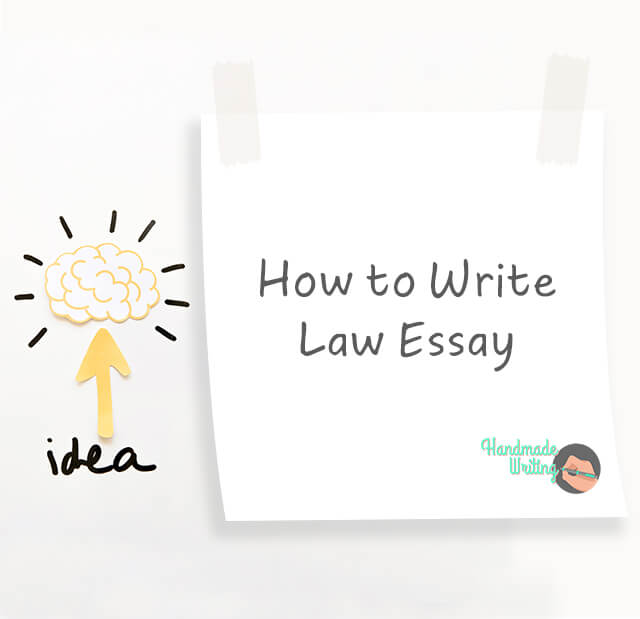
First things first, let’s discuss the legal essay scheme. It is rightly similar to the social science essay scheme. In both papers, it is necessary to explain a position on a particular issue or comment on a statement. For university law essay, especially in cases of specialties, it’s more complicated. There are several legal essay types :
- essay on quote explanation . Like in a school essay, the task here is to reveal the meaning of the expression and give a reasoned agreement or disagreement with it.
- essay on legal theory. The essence of this task is to describe one of the theories of law or any jurisprudence. This can be anything – for example, the theory that touches the Fifth Amendment.
- jurisprudence essay. In this assignment, you should review a specific case study or analyze the given document. Here, it’s important to adhere to special structure: first read the case, comprehend it, and only then give a critical account of this or that piece.
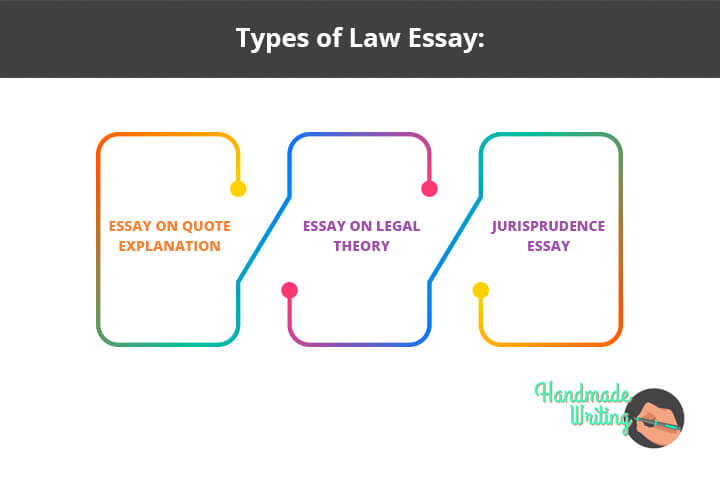
Law Essay Outline
The outline is one of the essential parts of law essay writing. At the point of creating it, you should jot down the structure of the main argument for each and every statement you deem appropriate for a text. This way, it’ll be much easier for you to organize the legal paper and facilitate its readability .
For example, if you need to comment on the quotation, it’s better to start an essay with brief information about the author. Then, consider the meaning of the citation in the context of his time and compare it to current conditions, as well as note whether you agree with the statement or not. Remember – the main task is to have a solid opinion in which you’re 100% confident. If not, switch the quote.
In the essay on legal theory, state the history of the issue, highlight the advantages and disadvantages of the case you are analyzing. Try to draw a parallel with the present, to indicate how relevant it is now for contemporary law students.
While reviewing a specific legal case or document, you should not be distracted by elements irrelevant or unrelated to the subject and give descriptions of similar situations. Consistently assess the actions of subjects or conduct an in-depth analysis of the provided regulation.
Write all of the crucial points in a short plan and shorten the above information into a couple of sentences. Afterward, you’ll be ready to use the crafted outline and write a law essay according to its key points .
Law Essay Structure
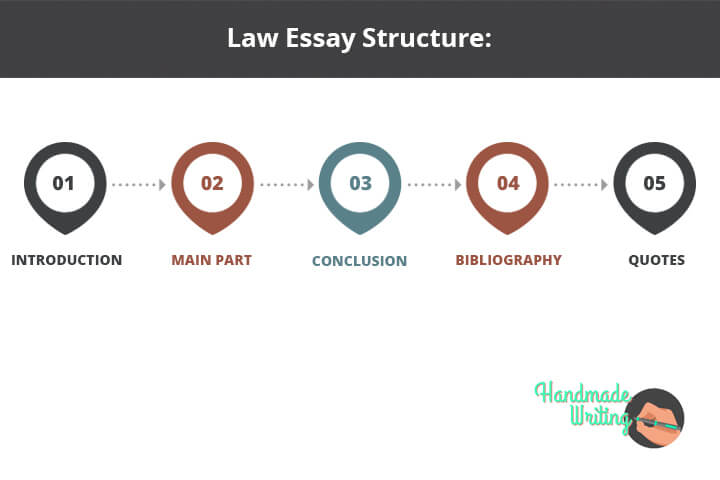
1. Introduction
Like any other type of writing, law essays start with introduction. A successful lead in is the one that captures attention instantly and forces readers to become interested in the law topic. In the beginning, you’ll need to clearly and precisely formulate a thesis statement of the entire piece, which you will then reveal in the following text. A great way to elaborate mediocre introduction with engaging filling is to state a concrete problem, controversy or issue that needs to be resolved.
2. Main part
This is the main element of the whole legal essay. It should contain an analysis of the quotation, legal theory, specific case, or document. Plus, your opinions about this or that aspect should be argued: for example, by references to other papers or practices. Another beneficial way to develop the main body of your essay is to use specific examples from law classes, including activities and important discussions , if applicable. Also, don’t forget that your law essay should always follow the thesis and develop it throughout the legal paper. This is a critical point to consider, as any departure from the established scheme will distort your work’s content.
3. Conclusion
Your finishing remarks should formulate the outcome of what was written above. A reasonable conclusion should be brief and powerful , as well as connected to the introduction. Besides, a good ending should contain a thesis of the whole law essay. However, don’t try to repeat your thesis word by word. Consider rephrasing it instead of mentioning the same statements so that the information is more easily digested for readers. Plus, you’ll need to provide a critical analysis of your work. For this, explain why your main argument backed up by primary and secondary sources is the highest point of conviction. Hence, your readers will see explicit reasoning and be more inclined to believe the truth you outlined in the paper.
4. Bibliography
A bibliography is a mandatory part of the work, and also the last one. At the end of your essay, you should list the documents (laws and other regulations) and books that were used in preparation for the article. Works cited page will help you validate the credibility of work and show readers that all statements and opinions are proven with relevant evidence. However, it doesn’t mean that your bibliography ought to be inserted just after you’ve written the entire text. To have a better vision of what source to pick for citing, include the list of used materials before writing the final version of your law essay. Accordingly, you’ll see sources in their entirety and easily cite them whenever needed.
The sayings of influential and famous people imbue any work with an air of authority . This is especially true for essays on law: professors appreciate it when students reinforce their considerations with the opinion of leaders and experts in their field.
Quotes for an essay on law are quite easy to find on the Internet or specialized digests.

If you choose to close the paper with a quote, it’ll be a great hook which will keep readers impressed by the essay long after they digest it. But feel free to add meaningful sayings also in the introduction or in the middle of a paper. Either way, quotes are a tool that helps make your reading highly impactful and appreciated.

These were the top advice on how to create a distinct law paper. We hope our advice will help you prepare an interesting and informative essay for college or university studies that’ll be graded with the highest mark. Once you manage to operate on the subtle art of legal essay writing, you’ll adjust to the complexities of its realization without difficulties. If you’re in doubt questioning your writing abilities, use custom essay writer service – we will create the best law essay tailored specifically for you.

A life lesson in Romeo and Juliet taught by death
Due to human nature, we draw conclusions only when life gives us a lesson since the experience of others is not so effective and powerful. Therefore, when analyzing and sorting out common problems we face, we may trace a parallel with well-known book characters or real historical figures. Moreover, we often compare our situations with […]

Ethical Research Paper Topics
Writing a research paper on ethics is not an easy task, especially if you do not possess excellent writing skills and do not like to contemplate controversial questions. But an ethics course is obligatory in all higher education institutions, and students have to look for a way out and be creative. When you find an […]

Art Research Paper Topics
Students obtaining degrees in fine art and art & design programs most commonly need to write a paper on art topics. However, this subject is becoming more popular in educational institutions for expanding students’ horizons. Thus, both groups of receivers of education: those who are into arts and those who only get acquainted with art […]
- Buy Custom Assignment
- Custom College Papers
- Buy Dissertation
- Buy Research Papers
- Buy Custom Term Papers
- Cheap Custom Term Papers
- Custom Courseworks
- Custom Thesis Papers
- Custom Expository Essays
- Custom Plagiarism Check
- Cheap Custom Essay
- Custom Argumentative Essays
- Custom Case Study
- Custom Annotated Bibliography
- Custom Book Report
- How It Works
- +1 (888) 398 0091
- Essay Samples
- Essay Topics
- Research Topics
- Uncategorized
- Writing Tips
How to Write a Law Essay: 8 Steps
December 28, 2023
1. Choosing an Essay Topic
When it comes to writing a law essay, choosing an appropriate topic is crucial. A well-chosen topic will make your research and writing process smoother and more enjoyable, while a poorly chosen topic can lead to frustration and a lackluster essay.
Firstly, consider what has piqued your interest in your law studies so far. Perhaps there was a case or topic that you found particularly intriguing, or an aspect of law that you feel needs further exploration. Alternatively, you could focus on a current legal issue that you feel strongly about and want to delve deeper into.
It’s also important to make sure your topic isn’t too broad or too narrow. Too broad of a topic can result in a lack of focus, while a topic that is too narrow won’t give you enough research material to work with.
Ultimately, choosing a law essay topic is about finding a balance between your personal interests and the practical aspects of your assignment. Take the time to carefully consider your options, and don’t be afraid to ask for input or guidance from your professor or classmates.
Possible Law Essay Topics
- The impact of social media on defamation laws.
- Analyzing the constitutionality of mandatory minimum sentencing.
- The effectiveness of restorative justice in reducing recidivism rates.
- Legal implications of artificial intelligence in the workplace.
- Exploring the rights of privacy versus national security in the digital age.
- Examining the legal and ethical issues surrounding euthanasia.
- Assessing the role of international law in combating climate change.
- Analyzing the legal framework for cyberbullying and online harassment.
- The legalization and regulation of recreational marijuana: a critical analysis.
- Exploring the intersection of intellectual property rights and emerging technologies.
Remember to choose a topic that aligns with your interests and research availability, while ensuring that it is adequately focused for a detailed analysis within the scope of your essay.
2. Researching the Topic
Before diving into writing a law essay, it’s essential to conduct thorough research on the chosen topic. This step is critical to ensure that the essay is factually correct, well-supported, and logically structured. Here are some tips on how to research effectively for a law essay:
- Begin by gathering basic information. Use specialized textbooks, journals, and databases to gain a foundational understanding of the topic.
- Use secondary sources to gain a broader perspective on the topic. Utilize reputable news sources, government publications, and online legal databases to broaden your search.
- Access case law. To support your arguments, cite legal cases that illustrate your argument. Access online case law databases that have accessible search functions.
- Use primary sources. Primary sources include statutes, regulation, and the constitution. It’s important to have a good grasp of the primary sources since they are the basis of much of legal research.
- Take notes. Keep track of all relevant information, including sources and citations. Use an organized format that will make outlining and writing the essay a simpler process.
- Evaluate and analyze. Through the research process, it’s important to analyze the information found. Determine what is and is not relevant, and how it factors into your argument.
By conducting thorough research, you will be able to support your argument with a well-evidenced and structured essay. Remember to keep track of all sources and citations as they will be necessary in the writing process.
3. Developing Strong Thesis Statement
Developing a strong thesis statement is essential when writing a law essay. This powerful statement sets the tone for the entire article and guides the reader’s understanding of your argument. To create an effective thesis statement, you must first fully understand the topic and question at hand. Take your time to research and gather relevant information to support your viewpoint. As you delve deeper into the subject, analyze different perspectives and identify the key arguments surrounding the topic. Once you have a clear understanding of the various viewpoints, narrow down your focus and craft a concise and persuasive thesis statement that clearly states your position. Remember, a strong thesis statement should be debatable, specific, and assertive. Spend time honing your thesis to ensure it effectively conveys your argument and engages the reader’s interest.
Example thesis statement:
“The death penalty should be abolished in the United States because it violates the Eighth Amendment, fails to act as an effective deterrent, and disproportionately affects marginalized communities.”
4. Structuring the Law Essay
Structuring your law essay is crucial to ensure clarity, coherence, and a logical flow of ideas. Here’s a breakdown of how to structure your law essay:
Introduction:
- Provide a brief overview of the topic and its significance.
- Present the thesis statement, clearly stating your argument.
Background and Context:
- Provide necessary background information to help the reader understand the topic.
- Explain relevant legal concepts, principles, or statutes related to your argument.
- Start each paragraph with a topic sentence that relates to your thesis statement.
- Present your arguments and support them with evidence, case law, or legal authorities.
- Use clear and concise language to explain your points and provide analysis.
Counter-Argument:
- Acknowledge and present the counter-argument(s) objectively and logically.
- Refute the counter-argument(s) with reasoned explanations and supportive evidence.
Conclusion:
- Summarize your main arguments and their supporting evidence.
- Restate your thesis statement and highlight its significance.
- Offer some final thoughts or suggestions for further research or action.
Remember to use appropriate headings and subheadings to structure your essay effectively. Use transition words and phrases to ensure a smooth flow between paragraphs. Additionally, ensure proper citations and referencing throughout the essay to maintain academic integrity.
5. Writing the Introduction
Writing the introduction is your opportunity to grab the reader’s attention and set the tone for your entire law essay. Here’s how you can effectively structure your introduction:
Start with a hook:
- Use a compelling statement, anecdote, or a relevant quote to engage the reader and create interest in your topic.
Provide background information:
- Give a brief overview of the legal issue or topic you will be discussing.
- Explain the significance and relevance of the topic to the field of law or society at large.
State the purpose and scope of your essay:
- Clearly state your thesis statement, which should encapsulate your main argument.
- Mention the key points you will address and the legal principles, cases, or statutes you will analyze.
Outline the essay structure:
- Provide a brief outline of how your essay will be structured.
- Mention the main sections or arguments you will present.
Establish the context:
- Explain any necessary legal concepts, terms, or background information that the reader needs to understand.
Remember to keep your introduction concise and focused. It should provide enough information to orient the reader and generate interest in your essay. However, save the detailed arguments and evidence for the main body of your essay. Aim to make your introduction clear, engaging, and persuasive, setting the stage for the rest of your law essay.
6. Developing the Body Paragraphs
Developing the body paragraphs is the core of your law essay, where you present and support your arguments with evidence and analysis. Here’s how to effectively structure and develop your body paragraphs:
Start with a topic sentence:
- Each body paragraph should begin with a clear topic sentence that relates to your thesis statement.
- The topic sentence sets the tone and direction for the paragraph.
Present your argument:
- Clearly state your argument or point of view in the opening sentences of each paragraph.
- Provide supporting evidence, such as case law, statutory provisions, or legal principles, to back up your argument.
Analyze and interpret the evidence:
- Explain the significance of the evidence in relation to your argument.
- Analyze how the evidence supports and strengthens your position.
Use legal authorities and sources:
- Cite relevant cases, statutes, or legal commentary to support your arguments.
- Refer to authoritative legal sources, such as court decisions or academic articles, to provide credibility.
Use clear and concise language:
- Clearly articulate your ideas using logical transitions and precise language.
- Avoid unnecessary jargon or overly complex language that may confuse the reader.
Remember to properly structure your paragraphs, provide sufficient evidence and analysis, and link your arguments back to your main thesis statement. Each paragraph should contribute to the overall coherence and flow of your essay, ensuring a convincing and well-supported argument.
7. Present the Counter-argument
Presenting the counter-argument is an essential component of writing a persuasive law essay. Failing to acknowledge opposing viewpoints weakens your argument and makes it appear biased. Therefore, it is crucial to identify different perspectives surrounding the topic and analyze these perspectives objectively. Once you have identified the counter-argument, you can present it in your essay, offering evidence and explanations to support it. Addressing counter-arguments in your essay strengthens your credibility as a writer and demonstrates your ability to look at a topic from multiple perspectives. Additionally, this approach makes your essay more convincing by acknowledging and addressing potential criticism of your argument. Keep in mind that effectively presenting the counter-argument requires thorough research, logical reasoning, and evidence-based arguments. Therefore, take your time to critically analyze opposing views to ensure your argument is backed up by relevant and reliable supporting evidence. By doing so, you can construct a well-reasoned and thoughtful essay that can withstand any counter-argument.
8. Crafting the Conclusion
Crafting a strong conclusion is essential to leave a lasting impression on the reader and effectively summarize your arguments in a law essay. Here are some key steps to consider when writing your conclusion:
Summarize your main points:
- Recapitulate the main arguments you presented in the body paragraphs.
- Provide a brief overview of the evidence you presented to support each argument.
Reinforce your thesis statement:
- Restate your thesis statement in a concise manner to remind the reader of your main argument.
- Emphasize the significance and relevance of your thesis in the context of the larger legal issue.
Offer a broader perspective:
- Connect your arguments to the wider legal or societal implications of the topic.
- Discuss the potential consequences or impact of your findings on the field of law or legal practice.
Suggest areas for further research:
- Highlight any unanswered questions or areas of debate that may require future exploration.
- Propose avenues for future research or policy development related to your topic.
Conclude with a compelling closing statement:
- Leave the reader with a thought-provoking final remark that leaves a lasting impression.
- Use a concise and powerful statement to tie together your essay and reinforce your main message.
Ensure that your conclusion is concise, focused, and aligned with your overall argument. It should serve as a strong ending to your law essay, leaving the reader with a clear understanding of your position and the importance of the topic discussed.
Use Legal Terms Accurately
In the realm of writing law essays, the accurate and precise use of legal terms is paramount. This subheading focuses on the importance of correctly employing legal terminology in order to craft an exceptional law essay.
Mastering legal terminology is essential for two reasons. Firstly, it demonstrates an understanding and grasp of the subject matter, showcasing your expertise to both professors and potential employers. Secondly, using legal terms accurately enhances the clarity and coherence of your arguments, making your essay more persuasive and compelling. However, it is crucial to strike a balance – overusing legal jargon may alienate readers who are not well-versed in the law.
To ensure accuracy, it is imperative to consult reliable legal sources such as authoritative textbooks, journals, or statutes. Moreover, reading and analyzing sample essays or exemplary legal writing can provide guidance on how to effectively incorporate legal terms into your own work. By diligently honing your legal language skills, you will significantly elevate the quality and impact of your law essays.
Sociology Research Topics Ideas
Importance of Computer in Nursing Practice Essay
History Research Paper Topics For Students
By clicking “Continue”, you agree to our terms of service and privacy policy. We’ll occasionally send you promo and account related emails.
Latest Articles
Navigating the complexities of a Document-Based Question (DBQ) essay can be daunting, especially given its unique blend of historical analysis...
An introduction speech stands as your first opportunity to connect with an audience, setting the tone for the message you...
Embarking on the journey to write a rough draft for an essay is not just a task but a pivotal...
I want to feel as happy, as your customers do, so I'd better order now
We use cookies on our website to give you the most relevant experience by remembering your preferences and repeat visits. By clicking “Accept All”, you consent to the use of ALL the cookies. However, you may visit "Cookie Settings" to provide a controlled consent.
Law Essay Examples

10+ Winning Law Essays Examples | Boost Your Grades Now
Published on: May 8, 2023
Last updated on: Jan 30, 2024

Share this article
Are you looking for inspiration to get started on your law essay? If so keep reading!
As a law student, you're expected to have excellent writing skills. Your essays should be well-structured, articulate, and persuasive. However, it's not always easy to know where to start or how to approach your writing.
That's where law essay examples come in - they provide a valuable resource that can help guide you through the process.
In this blog, we'll explore the law essay examples on different topics. Moreover, we will analyze the structure and format of a law essay.
So, let's get started!
On This Page On This Page -->
What is a Law Essay?
A law essay is a written assignment that requires the writer to analyze and evaluate legal issues, cases, or concepts.
The purpose of a law essay is to demonstrate a student's understanding of the subject matter. It also shows the student's ability to present an argument in a concise manner.
Want to gain more knowledge on how to write a high-quality law essay? Check out this video for insightful tips!
University Law Essay Examples
Let's take a closer look at some excellent university law essay examples that highlight the proper use of references.
Law Reflective Essay Example
Law Enforcement Essay Example
Law Reform Essay Example
Law Research Essay Example
Below, you will find some additional law essay samples that you may come across in your university assignments.
First Class Law Essay Example
Law School Transfer Essay Example
Law School Why X Essay Example
Law Essay Format and Structure
A well-structured and formatted law essay is essential for receiving high marks. Here are some key elements that should be included:
1. Introduction
- The introduction should introduce the main arguments of the essay.
- The first sentence should be attention-grabbing.
- The introduction should provide concise information about the broader significance of the topic.
- It should lead into the body of the essay.
- Each paragraph should have a clear topic sentence.
- The paragraph should include supporting evidence and analysis.
- The paragraphs should be logically connected.
3. Conclusion:
- The conclusion should summarize the main arguments of the essay.
- It should not introduce new information.
- It should demonstrate the significance of the arguments.
Let's take a look at an example of a well-structured law essay:
Check out the following pdfs for a better understanding:
Law Essay Format pdf
Law Essay Introduction Example pdf
Specific Law Essay Topics
Let's take a look at some specific law essay topic examples that can provide a foundation for deeper analysis.
Criminal Law Essay Example
Case Law Essay Example
Law Case Analysis Essay Example
Contract Law Essay Example
Ilac Law Essay Example
Public Law Essay Example
Critical Analysis Law Essay Example
Contract Law Essay Example Offer Acceptance
Additional Law Essay Samples
Let's explore some of the most frequently assigned law essay topics for writing assignments.
Development of Welfare Legislation for Animal Testing
Legal Analysis of Donald Trump's Leadership Style
Torts of Negligence and Battery in Medical Law
The Frustration of Contract in the Coronation Cases
Effectiveness of Gun Control Laws in the United States
The Unjust Intersection of Police Brutality and Racism
Nike Faces Gender Discrimination Lawsuit
A Dream to Become a Lawyer
Hate Crime Laws
Law Essay Writing Tips and Best Practices
Writing a law essay can be a rewarding and fulfilling experience. Here are some tips and best practices to help you write a successful law essay:
- Understand the assignment: Before you start writing your essay, make sure you understand the assignment requirements. This includes the topic, formatting requirements, and any specific instructions from your professor.
- Research extensively: A good law essay requires thorough research on the topic. Make use of primary and secondary sources, such as case law, legal journals, and academic articles, to support your arguments.
- Plan your essay: Before you start writing, plan your essay structure. This includes an introduction, body paragraphs, and a conclusion. The body paragraphs should be organized logically, with each paragraph focusing on a specific point or argument.
- Use clear and concise language: The language used in a law essay should be clear, concise, and precise. Avoid using jargon or technical terms that may be unfamiliar to the reader. Use plain language that is easy to understand.
- Cite your sources: In a law essay, it is important to cite your sources properly. Use the appropriate citation style, such as APA or MLA. Make sure to include a bibliography or reference list at the end of your essay.
- Use reputable sources: Ensure that your sources are reputable and reliable. Use academic databases, such as LexisNexis or Westlaw, to find legal cases and journal articles.
- Seek feedback: It can be helpful to seek feedback from your professor or a peer before submitting your essay. This can help you identify any areas that need improvement and ensure that your arguments are persuasive and well-supported
Common Mistakes To Avoid In Law Essay Writing
Here are some most common mistakes to avoid when writing a law essay:
- Failing to answer the question: Make sure that your essay clearly answers the question posed.
- Lack of clarity: Ensure that your essay is clear, concise, and well-organized.
- Plagiarism: Avoid plagiarism by properly citing all sources used in your essay.
- Inaccurate legal analysis: Ensure that your legal analysis is accurate and supported by legal authority.
- Poor syntax: Use proper grammar and syntax to ensure that your essay is well-written and easy to understand.
How To Edit And Proofread Your Law Essay
Here are some great tips to perfect your law essay:
- Take a break: Take a break before editing and proofreading to ensure a fresh perspective.
- Review for clarity: Review your essay for clarity, ensuring that your arguments are well-supported and easy to understand.
- Check for accuracy: Check your essay for accuracy, including legal analysis and citations.
- Check for grammar and spelling: Check for proper grammar, spelling, and punctuation.
- Read aloud: Read your essay aloud to catch any errors or awkward phrasing.
To sum it up!
Writing a law essay requires careful planning, extensive research, and attention to detail. Throughout this blog, we have explored different law essay examples. We have also discussed the format and structure of a well-written law essay.
By avoiding common mistakes and following best practices, you can write a successful essay. However, if you find yourself struggling with your law essay, do not hesitate to seek help from CollegeEssay.org .
We offer top-quality essay writing service to students at all academic levels.
Get in touch with our law essay writing service now and say ' write my essay ' and let us help you achieve your academic goals!
Also, give our AI essay writing tools a try!
Nova A. (Literature, Marketing)
As a Digital Content Strategist, Nova Allison has eight years of experience in writing both technical and scientific content. With a focus on developing online content plans that engage audiences, Nova strives to write pieces that are not only informative but captivating as well.
Paper Due? Why Suffer? That’s our Job!

- Privacy Policy
- Cookies Policy
- Terms of Use
- Refunds & Cancellations
- Our Writers
- Success Stories
- Our Guarantees
- Affiliate Program
- Referral Program
- AI Essay Writer
Disclaimer: All client orders are completed by our team of highly qualified human writers. The essays and papers provided by us are not to be used for submission but rather as learning models only.

When you are able to develop a skill in essay writing , you will realize how it is able to take your time and a lot of patience to improve more. Writing an essay would help you talk about a particular worldly issue without showing any biases. Essays are more on facts and a little of your opinion. Essays give writers the chance to incorporate their own experiences, the way how they think and their ability provide research data. It is an essential part in the learning process that enables you to mark your point of view. In this article, you will be able to encounter more about the idea of creating a simple yet presentable essay plan .
10+ Essay Plan Examples
1. essay plan template.

- Google Docs
2. Essay Plan Mind Map Template

- Google Slides
3. New Essay Plan Template
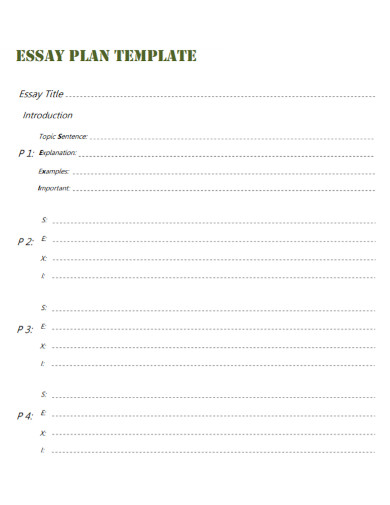
Size: 208 KB
4. Good Essay Plan
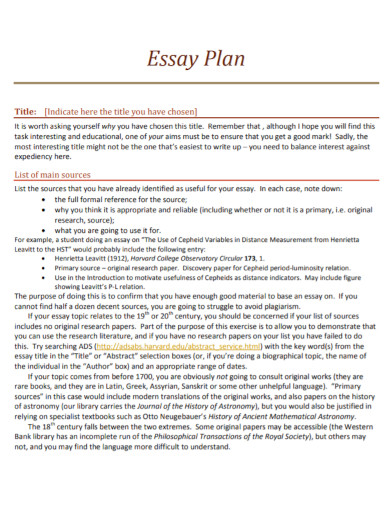
Size: 114 KB
5. Assignment Essay Plan
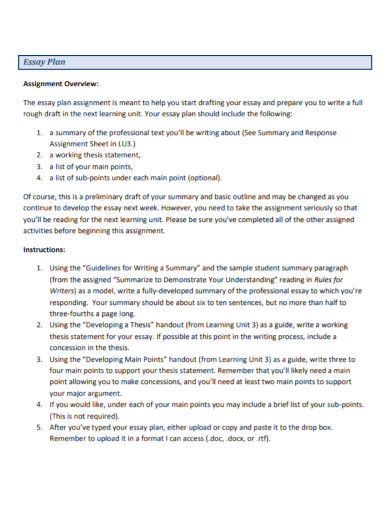
Size: 596 KB
6. Accessible Essay Plan
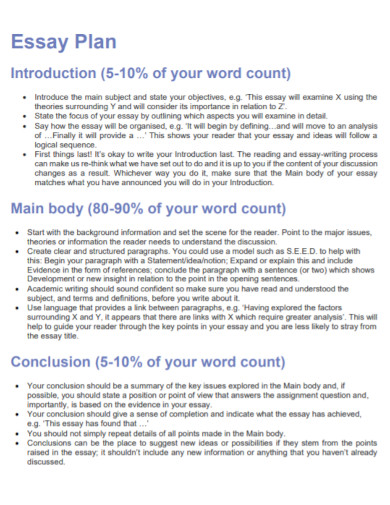
Size: 57 KB
7. Outlining of Essay Plan
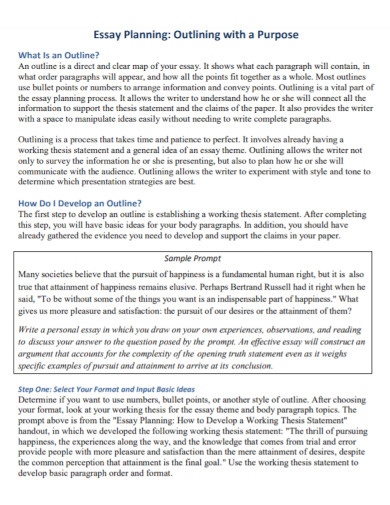
Size: 457 KB
8. Argumentative Essay Plan
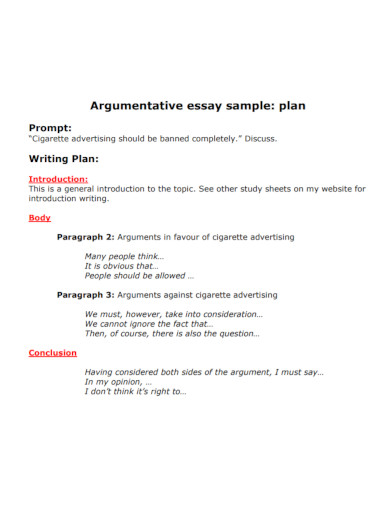
Size: 97 KB
9. Semantic Structure Essay Plan
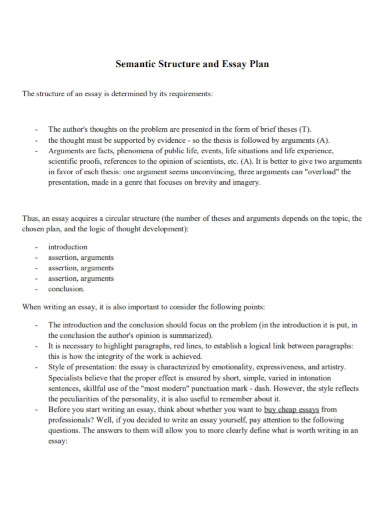
10. Basic Essay Plan
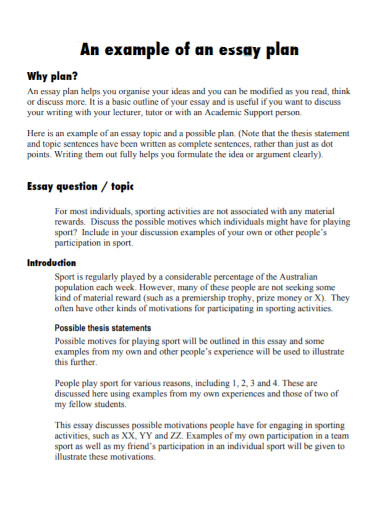
Size: 427 KB
11. Essay Plan Checklist
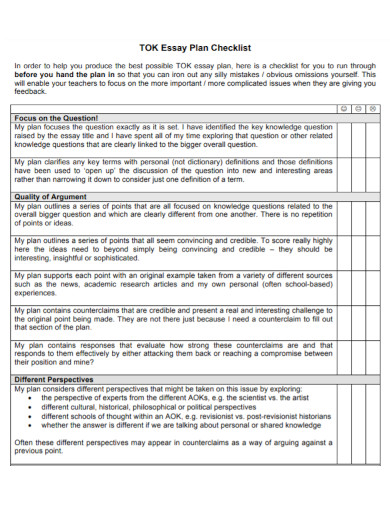
Size: 58 KB
What is an Essay Plan?
An essay plan is an act of making you practice how to organize ideas and make further modifications. It serves as an outline that is essential to use for discussing or writing about a certain issue. The purpose of an essay is to practice your mind on how to focus on an area where it can bring you to make a quality conclusion .
Planning is the way how you are able to visualize regarding the content of your essay. You should make sure that your essay is well-planned. Otherwise, you will end up having a sequence of phrases that are not even organized. Your main points should be clear and logically stated.
10 Steps for Essay Planning
- Read and analyze the essay questions.
- Write down the essay questions.
- Brainstorm or think of more ideas regarding the matter.
- List down all of your thoughts and the scope that covers the essay questions.
- Take note of the words or phrases that you think are essential in your work.
- Write down the main points that can be used to answer the questions.
- Look through any type of handouts that can be used to have a more detailed outline of your essay.
- Do not forget to take note of the sources of all the information you got. This will be indicated in the reference list.
- Do not make your outline too complicated.
- Think about how many words you need to write, the elements that you cover in your essay and how much space you should be able to allot to each of your outline section.
Here is an outline of your essay that you need to follow:
- Essay question or topic
- Introduction – this includes your thesis statement
- 1 st Paragraph – this includes your topic sentence and evidence
- 2 nd Paragraph – this also contains a topic sentence and evidence
- 3 rd Paragraph – just like the first and second paragraph, it contains a topic sentence or an idea that is supported by an evidence or claim
- Conclusion – provides the possible motivations and restatement of central idea
- Reference – the list of the sources of your texts, data or images that you do not own
What is a good essay?
A good essay must have one clear main idea. Each of the paragraphs must have a topic sentence to be supported with a supporting detail. They should be organized logically and must be able to stick together. Always make sure that an essay would give a best impression to the readers.
What is the standard number of paragraphs per essay?
Essays must have at least five paragraphs.
What is the best way to start an essay plan?
The best way to start an essay plan is to prepare a box plan that consists of the essay elements. These elements will serve as your guide to be able to write continuously without getting lost of the usual standard arrangement.
Effective essay planning helps in making your work be done immediately. It speeds up your writing process and gives you precise direction while working on it. You just have to follow the correct structure and format of your essay. Always consider your audience when making an essay because they are the ones who will give you feedback about it. The attention that they should give also matters.

Essay Plan Generator
Text prompt
- Instructive
- Professional
Create an Essay Plan on how you organize your study schedule and its benefits
Develop an Essay Plan on the role of exercise in student life

IMAGES
VIDEO
COMMENTS
Restate key supporting arguments. The final stage of creating the plan of your law essay is to pick 2 to 3 key supporting arguments which you discussed in the main body of your paper and outline them again. This time, however, you will not be getting into a detailed discussion of how case law or statute sections justify your supporting arguments.
Planning Your Law Essay. The next step is to plan your essay: as we identified, the minimum requirements will be an introduction, body and conclusion, unless you are dealing with a report or dissertation. When you have done some research, you may wish to make a rough plan of where you intend to go with the essay. For example:
The first step in writing a top-notch law essay is to understand the essay question and planning your response. You should take care to read and analyze the question provided, identifying the main issues, required legal areas, and the keywords that will guide your research. Create a rough essay plan, outlining the main arguments and research ...
10 Apr. Written By Law Tutor. Various steps are involved in creating a plan for a law essay. This includes writing, brainstorming, outlining, creating the draft, and submitting the work. The most effective way to arrange the tasks is to create an outline of one's essay. This will allow a person to keep track of your tasks and ensure you do not ...
In this article, we'll cover some top tips to guide you through the process of planning, researching, structuring and writing a first-class law essay with confidence. 1. Start In Advance. Give yourself plenty of time to plan, research and write your law essay. Always aim to start your law essay as soon as you have the question.
Create an Outline. Outline the structure of your essay, dividing it into introduction, body paragraphs, and conclusion. Each section should serve a specific purpose. The introduction should introduce the topic and present your thesis, while the body paragraphs delve into the main arguments and legal analysis.
This resource offers tips and resources to help you plan and write law essays. There are usually two types of law essays: the theoretical based essay and the problem-style essay. The theoretical based essay may ask you to critically discuss a new piece of legislation or a recent case in relation to existing laws or legal principles.
A good structure for a law report would be as follows: Title Page: showing the title of the report, the author, the person for whom the report is prepared, and the date of completion. Summary/Synopsis/Executive Summary: (approx 10% of word count) - this will identify: The purpose of the report, The scope of the report - issues covered/not ...
The Introduction. You should aim to do four things in your introduction: Set out any definitions of any key terms outlined in the essay title or statement of your essay. State what the overall aim of your essay is. Explain how you plan to achieve this aim. Provide a brief summary of what your essay will conclude.
The law essay help guides below were written by our expert writers, as a learning aid to help you with your studies. If you are looking for help with your law essay help guide then we offer a comprehensive writing service provided by fully qualified academics in your field of study. Law Essay Writing Service.
Here are some practical and practical tips for planning a one good law essay. Highlight specific words and phrases in the essay's title. Take a brain dump for the words that you have highlighted and note them down. Find a connection between these phrases and words. Develop a strategy to come up with your answer basedon these phrases.
The introduction should also provide a roadmap to a user by illustrating the structure used in a paper. A classic example of a law essay is the following: "The essay will be divided into four main sections. In section I, the essay will provide an in-depth understanding of …. Act.
Present the central argument. One of the most important aspects of your law essay that needs to be included in the introduction is the central argument, that is the point you will be trying to prove in your essay. Relying on simple vocabulary and phrasing, explain the central argument that you will be attempting to prove throughout your essay.
In order to critically evaluate a law essay, you need to go beyond asking the basic questions. Just answering with the specific law on a certain issue isn't enough to make you a good lawyer. You need to build the ability to think for yourself and have an opinion on every case and statute, which you can defend with solid arguments.
Write all of the crucial points in a short plan and shorten the above information into a couple of sentences. Afterward, you'll be ready to use the crafted outline and write a law essay according to its key points. Law Essay Structure. 1. Introduction. Like any other type of writing, law essays start with introduction.
scary when you think of your essay as five 400-word paragraphs with an introduction and a conclusion instead of one massive 2,500 word piece. Tip: It is better to underestimate how many paragraphs you need to write. Even in the above example it might be better to plan for six paragraphs as it is easier to take words
Explain the significance and relevance of the topic to the field of law or society at large. State the purpose and scope of your essay: Clearly state your thesis statement, which should encapsulate your main argument. Mention the key points you will address and the legal principles, cases, or statutes you will analyze.
The example law essays below were written by students to help you with your own studies. If you are looking for help with your law essay then we offer a comprehensive writing service provided by fully qualified academics in your field of study. Law Essay Writing Service.
These hand-picked law essay examples will show you how it's done. Check out now to get started on your law essay! Order. Services ... Plan your essay: Before you start writing, plan your essay structure. This includes an introduction, body paragraphs, and a conclusion. The body paragraphs should be organized logically, with each paragraph ...
SAMPLE LAW ESSAYS. Law Essay Samples. Getting a First on a law essay it difficult and takes a lot of effort. First, fully comprehend the essay question and list its essential elements. To establish a strong base of knowledge on the subject, do in-depth study and read academic publications, citing legislation and cases.
The essay template allows you to plan essays from 500 words to 5,500 words long. This covers most essays set at law schools around the UK, including in public law, criminal law, contract law, tort law, equity & trusts, land law, EU law and other law-related modules.
Read and download a selection of free sample Law essays written by Oxbridge academics, as guidance and inspiration for your own research and learning. ... Subject: Human Rights Law; Type: Essay plan; Grade: 2:2; The conflation of mental disorder with dangerosity in the medico-legal discourse provides legitimacy for the infringement of the human ...
10 Steps for Essay Planning. Read and analyze the essay questions. Write down the essay questions. Brainstorm or think of more ideas regarding the matter. List down all of your thoughts and the scope that covers the essay questions. Take note of the words or phrases that you think are essential in your work.